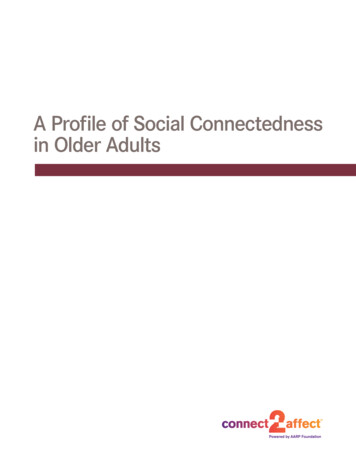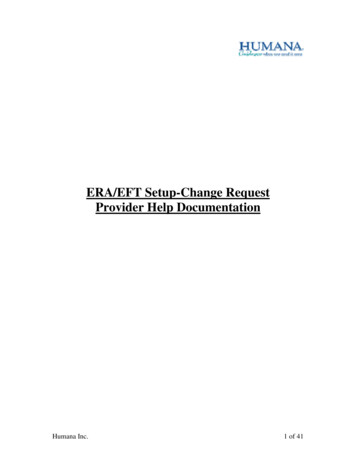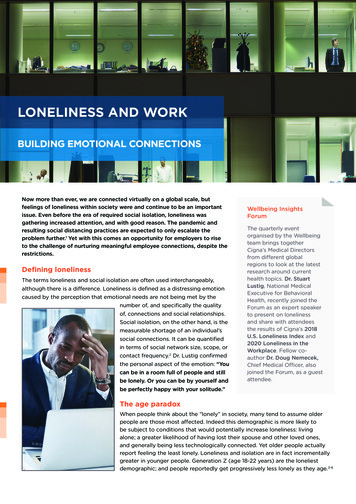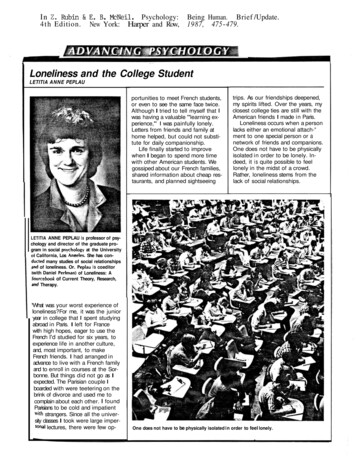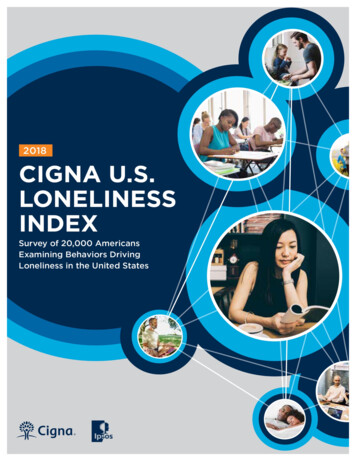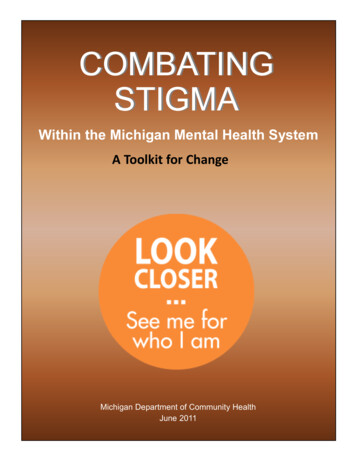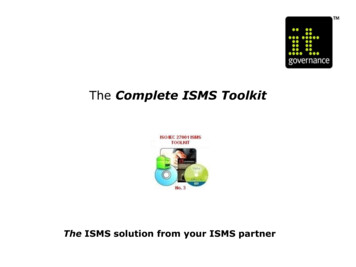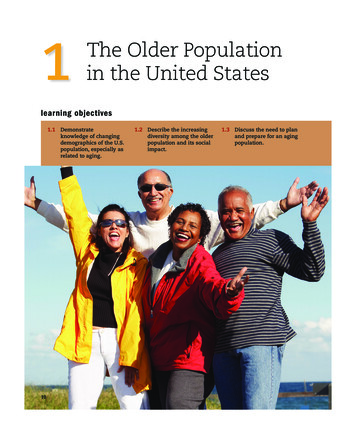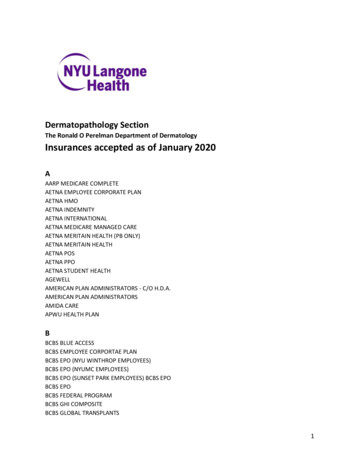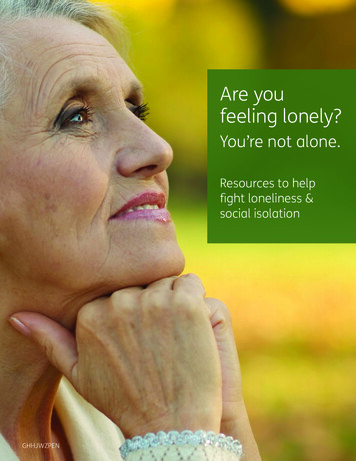
Transcription
Are youfeeling lonely?You’re not alone.Resources to helpfight loneliness &social isolationGHHJWZPEN1
TABLE OF CONTENTSSection 1Healthcare needs. 4Feeling lonely and socially isolated can bedangerous to your health. But sometimes healthchallenges like surgery, depression, or hearing losscan make us feel more stressed and alone.Staying connected to your physician, nurses, andother healthcare professionals, and knowing whatresources are available to you, will help you betterprepare for all your healthcare needs.Feeling lonely? You’re not alone.Section 2If you’re feeling lonely, you’re not alone. Anyonecan feel lonely. Did you know that it’s commonto experience feelings of loneliness even whensurrounded by friends and family? Or that feelinglonely can be as dangerous for your health assmoking 15 cigarettes a day? 1 That’s why it’simportant for you to know, no matter your situation,there are things you can do to get the help you need.Staying engaged.11Whether it’s making new friends, finding a newplace to live, getting around, or managing stress,staying meaningfully engaged and keeping strongconnections may be crucial to your emotional andphysical well-being.Section 3Supporting loved ones.19How to use your resource kitThis resource kit is designed to help you on yourjourney to feeling connected and healthy, with vitalinformation, tools, and resources you need rightat your fingertips.Helping loved ones maintain their health andwell-being is a very important and often difficultrole to play. It’s a role that can sometimesleave you feeling tired, stressed, trapped, or acombination of all three.Inside, you’ll find four sections organized withinformation, useful tips, and resources that mayhelp make your life easier.*Section 4Community resources.22A listing of other resources that may help.* Remember, this communication doesn’t guaranteebenefits and doesn’t indicate all services receivedwill be covered by your plan. Please refer to yourEvidence of Coverage or call Customer Serviceat the number on the back of your insurance IDcard to confirm that the service will be covered byyour plan.2
Why do I feel lonely even whenI’m not alone?What does this mean for me andmy loved ones?Loneliness is a feeling of sadness or distress aboutbeing by ourselves, or feeling disconnected from theworld around us. It may become stronger over time,and it’s possible to feel lonely even when surroundedby those you cherish most.We all need the support of others to make us feelunderstood and to help us feel like we’re makingan impact on the world. Without these bonds, it’snatural to feel defeated or frustrated. It can alsobe tempting to brush away these feelings becausewe think they’re silly. But please know that you’renot alone. Did you know that some version ofloneliness impacts up to 43 percent of older adults?2And remember, it can be caused by a wide rangeof issues, like grief or loss, the inablility to be asactive as you used to, friends moving away, childrengrowing up, losing a pet, medical conditions orsurgery, or retirement.Loneliness can happen when we feel like we don’thave a sense of belonging, meaningful socialengagement, or connection to networks like ourneighbors or other friend groups. But it can alsohappen when we have full lives and are only missingsome of those things, or even just one person.Loneliness is a common emotion, and it is likely thatat some point in our lives and whatever our age wewill experience it.These feelings of social isolation and loneliness,especially among seniors, can actually have asignificant impact on health. For example, theycan lead to a 32 percent increase in risk of stroke.3Social isolation is when we’re physically separatedfrom other people. Sometimes this occurs becauseof life situations, like recovering from surgery, havingchildren who live far away, being busy taking careof someone we love, or the fact that getting oldermakes it too hard to drive. It can also occur whenwe lose groups of friends or loved ones, or if gettingout of the house just seems like too much effort.We hope you find resources in this toolkit thatcan help.Sources:Older people and social isolation: A review of the evidence. Wirral council Business & Public Health IntelligenceTeam. http://info.wirral.nhs.uk/document uploads/JSNA2015/Older People Social Isolation 2015 FINAL.pdfSenior Isolation and Loneliness. The Root Cause Coalition. s1L oneliness Is a Threat to Longevity, Even in People Who Like to Be Alone, loneliness-dementia.html2 esearchers Confront an Epidemic of Loneliness, The New York Times, September 2016, ss-aging-health-effects.html? r 13 altorta NK, Kanaan M, Gilbody S, et al. Loneliness and social isolation as risk factors for coronary heartVdisease and stroke: systematic review and meta-analysis of longitudinal observational studies. Heart2016;102:1009-1016.3
SECTION 1:HealthcareneedsFeeling lonely and sociallyisolated can be dangerous toyour health. But sometimeshealth challenges like surgery,depression, or hearing loss canmake us feel more stressedand alone.Staying connected to yourphysician, nurses, and otherhealthcare professionals, andknowing what resources areavailable to you, will help youbetter prepare for all yourhealthcare needs.4
Section 1 Healthcare needsCommunicating with your doctorHelping your doctor understand youA good doctor-patient relationship is one where youboth work together to solve medical problems andmaintain your health.Be sure to answer questions as completely andhonestly as possible. This is important to help you getthe right diagnosis and treatment. Don’t hesitate tomention a symptom or experience you have. Sharingan article on the subject or telling them a story aboutyour everyday life might help make a point.This also means you can talk about challenges inyour everyday life, like getting to appointments,having enough to eat, and having support. We mightnot think about these things impacting our health orbeing something our doctor can help with, but theonly way they will know what is troubling you andwhat may or may not be working is if you tell them.If you realize there is something you forgot to askduring the visit, call the doctor’s office. When leavinga message, it’s important to explain your exactreason for calling.Choosing a doctor or healthcareproviderDiscussing diagnosis and treatmentWhen you receive a new diagnosis and are giventreatment recommendations, you may want to raisesome important questions with your doctor, such as:The first step is to choose a doctor with whomyou can speak easily and openly. Ask friends,relatives, and other medical professionals forrecommendations. Ask specific questions to figureout if they might be right for you. Try to find severalto choose from. When you meet with a doctor, trysome of these communication tips: A re there other possible diagnoses or explanationsfor my condition or symptoms? W hat symptoms or changes in my condition mightI expect? Bring a list of questions and concerns with you I s the goal of the treatment to cure my conditionor just lessen the symptoms? D on’t hesitate to ask as many questions asyou need Are there other possible treatments? I f something is unclear to you or worries you,be sure to ask for an explanation and clarity untilyou feel comfortable with the answer A re there any foods, medications, or exercises thatI should either take or avoid?Consider bringing a friend or relative with you ifyou know you’ll be discussing a recent diagnosis,possible surgery, or any other serious topic. Besidesoffering support, another person might think ofquestions, and can help by taking notes for later.Remember that you don’t have to stay with a doctorif you don’t feel comfortable. You may need to meetwith a few until you find the right match.Sources:Clear Communication: Talking to Your Doctor, National Institutes of lear-communication/talking-your-doctorTalking With Your Doctor: A Guide for Older People, National Institute on tter5
Section 1 Healthcare needsSupport after surgeryIf surgery is coming up for you or someone youlove, the doctor may ask questions to makesure someone will be able to help with recovery.They’ll also want to know if you have someoneto keep you company.If you don’t have family or close friends nearby,some organizations that can help find in-homesupport are:Even small surgeries come with many sideeffects that make it hard to be alone. It mightbe hard to get dressed, drive, take care of pets,or prepare food. You may find that being stuckat home recovering is lonely and makes youfeel depressed. A rea Agencies on Aging (AAA): AAA servesolder adults across the country with supportlike transportation and in-home services.Call 800-677-1116 (TTY: 711) Monday – Friday,9 a.m. to 8 p.m. Eastern Time, or visit theirwebsite, www.n4a.orgBut there are many reasons we might not havepeople around to support us. Some parentsdon’t ask their children to come by because theyfeel like it’s an imposition. Some of us are afraidto ask friends to come visit. Others feel like theyshould have people who will be there withoutbeing asked.Please don’t assume that other people willknow what kind of help you need. In fact, theymay want to help, but are afraid to call becausethey feel like they’re bothering you!Before surgery, use the calendar below to getyour family and friends to write in their nameson the day they’ll come visit. C onnect2Affect: Connect2Affect is an onlinedirectory created by the AARP Foundation,connecting people to transportation, in-homeservices, and more. Visit their website,www.connect2affect.org E ldercare Locator: The Eldercare Locatoris a nationwide service that connects olderAmericans and their caregivers with localsupport resources. Call 800-677-1116 (TTY: 711)Monday – Friday, 9 a.m. to 8 p.m. Eastern Time,or visit their website, www.eldercare.gov Y our medical insurance: Call the number onthe back of your member ID card to see if yourmedical insurance covers any in-home care orsupport while you recoverVisitor Saturday6
Section 1 Healthcare needsLoneliness and substance abuseSocial isolation and loneliness have a huge effect ondrug addiction and alcoholism. Many people turn tosubstances because they’re lonely – and many people arelonely because they’re addicted to substances. Studiesshow that those of us who feel more socially isolatedstruggle with increased mental health and substanceabuse issues.5 The opposite is true as well: Addictionto drugs and alcohol can be the cause of isolation.Finding helpNational Institute on Alcohol Abuseand Alcoholism:Resources and treatment locators areavailable online at National Institute on Drug Abuse:Resources and treatment locators areavailable online at www.drugabuse.gov/patients-families. You can also findtheir video series at: www.youtube.com/NIDANIHAddiction can isolate peoplePeople who find themselves using drugs and alcohol tocope with depression, anxiety, and stress live in denialand guilt. Trapped in those overwhelming emotions,you can see why people who are addicted often coverup their fears with anger, false bravado, and verballyor emotionally abusive behaviors.Those struggling with addiction are hurting and inturn, they hurt those around them. As the diseaseof addiction progresses, many people hurt theirrelationships with friends and family members, leavingthem alone physically, mentally, and even spiritually.6When we’re lonely, we can run outof hopeIndividuals suffering with addiction may pull away toconceal their illness and avoid feeling like they’re judgedor shamed. Addiction can make a person feel unable tochange the situation and may take away the optimismand self-esteem needed to help relationships stayon track.7Substance Abuse and Mental HealthServices Administration’s NationalHelpline:A confidential, free, 24-7 informationservice in English and Spanish forindividuals and family members facingmental and/or substance use disorders.This service provides referrals to localtreatment facilities, support groups,and community-based organizations.Call 1-800-662-HELP (4357)(TTY: 1-800-487-4889), or go tohttps://findtreatment.samhsa.gov for anonline treatment locator.Loneliness and substance abuse can make each otherworse, but working on one may improve the other.Sources:5 ental Health Disorders – Treatment and Counseling Services, DBT Therapy, Addiction use-and-addiction/mental-health-disorders/6L oneliness grows from individual ache to public health hazard, The Washington -99f3-184bc379b12d story.html?utm term .e8dc36b9f3967Lawrence Weinstein, MD, ABHM, FAMA7
Section 1 Healthcare needsUnderstanding the causes and impact of stressEveryone responds to stress in different ways,and situations can cause stress unique to eachindividual. Here, we’ll share some of the mostcommon symptoms of stress and ways to helpmanage them. If you have any symptoms orquestions, it’s always best to speak with yourdoctor.A checklist about stress:Some of the mostcommon causesof stress:o Financial straino Lack of personal timeo W orrying abouta loved oneo Lack of sleepEmotional symptoms:Physical symptoms:Behavioral symptoms:o Anger and irritabilityo Dizzinesso Eating more or lesso Anxietyo Changes in weighto S adness and lossof interest in people orhobbieso M uscle tensionand headacheso S leeping too muchor too littleo Indigestiono E xhaustion andfatigueo Isolating yourselfo N ervous or bad habits(e.g., nail biting orusing alcohol)o I solation and socialwithdrawalWays to dispel stress: G et organized – prioritize and organize yourschedule and your responsibilities and don’tovercommit T ake time away to relax and do the things youenjoy – even taking a walk every day can help Talk to friends – sharing your feelings with peopleyou’re close to can help you feel better L ook on the bright side – keep a positive attitudeand a sense of humor, and remind yourself of allthe great things in your life E at healthy and exercise – being healthy givesyou more energy and makes you feel goodabout yourself8
Section 1 Healthcare needsAnxiety and depressionRecognizing and coping with anxietyIdentifying and helping managedepressionIf your level of nervousness is starting to disruptyour life, it doesn’t mean you’re weak or crazy.You may be one of the millions of people worldwidesuffering from a treatable disorder, known asgeneralized anxiety disorder (GAD). The AmericanPsychiatric Association definition of GAD is“persistent and excessive worry that interfereswith daily activities.” 8Some level of stress is normal. But chronic stressfulsituations can increase the risk of developingdepression. Feelings such as sadness, anger, andanxiety shouldn’t be overlooked. If you feel you havesevere depression that lifestyle changes can’t helpremedy, you may need to seek professional help.Some symptoms of depression:Meditation and mindfulness may help ifyou’re anxious A change in eating habits resulting in dramaticweight gain or loss T ry deep breathing. When you’re nervous, you canstop and take some deep breaths. Slowly fill yourbelly and chest, then let the air out slowly as well.This simple action can provide a great deal of relief. Feeling tired all the time L osing interest in people or activities that oncebrought you pleasure Becoming easily agitated or angered T ry yoga, tai chi, and other exercise. Even a10-minute walk may enhance energy and reducetension. It’s important to talk to your doctor beforestarting any new exercise routine.Steps to take if you think you’re depressed: D o some online research and learn as muchas you can about depression T ake a break. That might be a vacation, but itmight also mean sitting quietly in a peaceful place,playing with your pet, or gardening. I dentify the causes of your depression –those could be something like financial strain,weight gain, or relationship problems Talk to a professionalFinding help B e committed to your treatment regimen –it takes timeAnxiety and Depression Associationof America: www.adaa.orgMental Health America:www.mentalhealthamerica.netSources:Anxiety Disorders. American atients-families/anxiety-disordersNational Suicide Prevention Lifeline,24 hours a day, 7 days a week:1-800-273-8255 (TTY: 711)Generalized Anxiety Disorder (GAD). NationalInstitute of Mental atrists: www.find-a-psychiatrist.comPsychologists: www.locator.apa.org89 ty-disorders/what-are-anxiety-disorders
Section 1 Healthcare needsHow can your hearing and eyesight increase loneliness?Hearing or vision loss can be difficult topinpoint in yourself, but can also make usstart avoiding situations where it’s hardto hear or see clearly because we feelembarrassed or confused.In the U.S., up to two-thirds of adults over70 will experience some age-related hearingloss, according to Harvard Medical School.9Along with that, the CDC tells us that morethan three million Americans are legally blindor visually impaired. These problems canmake us feel more stressed and alone. Theycan also prevent us from doing activities weenjoy, like watching television, cooking, orhandling our household business. If you arehaving trouble hearing or seeing, please getin touch with a medical professional.Do you need a hearing test?This quiz from the National Institute on Deafness andOther Communication Disorders can help you identifyif you may need to take a hearing test:o D o you sometimes feel embarrassed when youmeet new people because you struggle to hear?o D o you feel frustrated when talking to membersof your family because you have difficulty hearingthem?o D o you have difficulty hearing or understandingcoworkers, clients, or customers?o D o you feel restricted or limited by a hearingproblem?o D o you have difficulty hearing when visiting friends,relatives, or neighbors?o D o you have trouble hearing in the moviesor in the theater?o D oes a hearing problem cause you to argue withfamily members?o D o you have trouble hearing the TV or radioat levels that are loud enough for others?o D o you feel that any difficulty with your hearinglimits your personal or social life?o D o you have trouble hearing family or friends whenyou are together in a restaurant?If you answered yes to three or more of these, pleasetalk with your doctor or another hearing health providerabout whether or not you need to have your hearingchecked. Learn more at www.nidcd.nih.gov/hearingSources:National Institute on Deafness and Other Communication -ear-infections-deafnessHearing loss may be linked to mental decline. Harvard Health 25824910
SECTION 2:StayingengagedWhether it’s making new friends,finding a new place to live, gettingaround, or managing stress,staying meaningfully engaged andkeeping strong connections maybe crucial to your emotional andphysical well-being. The followingresources can help you plan forand manage many challengesand transitions.11
Section 2 Staying engagedTips for staying connected and engaged D on’t let being a non-driver stop you from stayingactive. Use the transportation suggestions in thistoolkit to help find ways to get out and about. J oin an outdoor or walking group near you toget exercise and meet people at the same time I f you have activities you enjoy, like playingbridge, golfing, or crafting, join a club focusedon that hobby P ets can be great companions. Depending on yourphysical abilities, having a dog, cat, or other petin the house can provide you with company anda routine. T each classes at a local community center,place of worship, or club like the Girl Scouts U se digital tools, like email, Skype, and socialmedia, to see photos, updates, and talk to lovedones all over the country G o back to school – many local colleges offerflexible classes for adults to take or audit.These can even be online or at night. S chedule a few times a week to call or visita friend or relative V olunteer for a cause that’s meaningful to you.Helping hands and expertise are always welcome!o A rea Agencies on Aging (AAA): AAAserves older adults across the countrywith support like transportation and inhome services. To learn more about theAAA in your area, or call 800-677-1116(TTY: 711) Monday – Friday, 9 a.m. to8 p.m. Eastern Time, or visit their website,www.n4a.orgo Eldercare Locator: The Eldercare Locatoris a nationwide service that connectsolder Americans and their caregivers withtrustworthy local support resources.Call 800-677-1116 (TTY: 711) Monday –Friday, 9 a.m. to 8 p.m. Eastern Time, or visittheir website, www.eldercare.govo Volunteer Match: This service lets you findvolunteer opportunities. Visit their website,www.volunteermatch.orgo C onnect2Affect: Connect2Affect is anonline directory created by the AARPFoundation, connecting people totransportation, volunteer programs, seniorcenters, and more. Visit their website,www.connect2affect.orgSources:Expand your Circles: Prevent Isolation and Loneliness as You Age, dfTechnology Helps Seniors Stay Connected and Engaged, ors-stay-connected-and-engaged/12
Section 2 Staying engagedHelping yourself stay sharp!Although our brains and mental functions decline as we age, we can take steps to slow the changes andmaximize our brain power. If memory loss seems extreme, please talk to a doctor.Ways to stay sharp: Feed your brain C hange your habits: Do your daily taskswith your non-dominant hand (if you’reright-handed, try using your left, for example),or read a book in a genre you’ve never tried. C hallenge yourself: Take a class, learn anotherlanguage, do a puzzle, or try out word ormath games P ractice paying attention: What is everyone inthe room wearing? Are there any changes inyour neighborhood? Who stars in your favoriteTV show? R eview what you’ve done and seen: If you’rereading a book, summarize its contents toyourself. Try to reconstruct your morning stepby step. T ake care of your health! All of the usualguidelines apply: Stop smoking, exercise, drinkplenty of water, get enough sleep, and try toeat plenty of vegetables and fruit. U se your senses: Try to identify every ingredientin your food by taste. Close your eyes and listento each background noise. What do you hear? I f you suffer from depression or anxiety, pleaseseek treatmentAlzheimer’s warning signsPeople often fear that memory loss meansAlzheimer’s disease. Sometimes it doesn’t.Just in case, here are some other warning signsassociated with Alzheimer’s: F orgetting what things are for, like not knowinghow to use car keys Forgetting how to do familiar tasks Forgetting simple words Getting lost in familiar places Putting things in strange placesSources:Alzheimer’s Association. 10 Early Signs and Symptoms of Alzheimer’s.http://www.alz.org/alzheimers disease 10 signs of alzheimers.aspMayo Clinic. Memory Loss: 7 Tips to Improve Your /healthy-aging/in-depth/memory-loss/art-2004651813
Section 2 Staying engagedFinding transportation servicesLoss of mobility and transportation not only threatens independence, but also can impact self-esteemand sense of connection. The primary types of transportation services available in most communities are:Dial-a-ride. This option provides door-to-doorservice from one location to another. It generallyrequires advance reservations, may charge a feeor request a donation on a per-ride basis, and mayinclude passenger assistance between the frontdoor and the vehicle.Paratransit service. This includes sharedrides, subscription services, carpooling, andvanpooling. Fees may or may not be attachedto this transportation option. In some cases, thepassenger may need to complete an applicationto qualify and then be certified for eligibility.Fixed-route service. Service is provided along anestablished route with designated stops whereriders can get on and off. Generally, service isprovided by larger vehicles and runs on a regularroute that does not require reservations. Fares arepaid for each ride; many communities provide adiscount for senior citizens.Ride-sharing. These programs match people whoneed rides with volunteer drivers who have spacein their cars. This service is usually scheduled inadvance and has a specific destination.On-demand services: Lyft and Uber. These servicescome directly to someone’s home and take themto any destination. Get started at www.lyft.comor www.uber.com, or download the Lyft or Ubermobile apps. You’ll need an email address andcredit or debit card to create an account. To learnmore about setting up a ride, go to help.lyft.com orhelp.uber.com.Subscription service. This option consists ofprearranged routes and schedules based on theneeds of the passenger. Riders must register inadvance for this service.Vanpooling. This service involves prearrangedride-sharing transportation that operates regularly.Vans may be publicly or privately operated.14
Section 2 Staying engagedTransportation: Questions and ways to find a rideQuestions to ask Which types of services are available? D o I need to pre-arrange for transportationservices? If so, how far in advance mustreservations be made? W hat are the maximum and minimum distances Ican travel with this service? C an I make advance reservations for standingappointments, like doctors’ appointments, insteadof calling each time? What is the cost? Is it per ride or round-trip? I s there an application process involved in order toqualify for services? If so, who completes the form?Do I need to reapply at any time? C an I travel with a companion, and is there a costfor additional passengers? Are other people picked up during my ride? W hat kind of physical assistance will thedriver provide?Ways to find transportation A merican Occupational Therapy Association(AOTA): AOTA offers a nationwide database ofdriving programs and specialists who can helpyou stay behind the wheel, along with resourceson safe driving as you age. Visit their website,www.aota.org/olderdriver A rea Agencies on Aging: Call 800-677-1116(TTY: 711) Monday – Friday, 9 a.m. to 8 p.m.Eastern Time, or visit their website,www.n4a.org C onnect2Affect: Visit their website,www.connect2affect.org E ldercare Locator: Call 800-677-1116(TTY: 711) Monday – Friday, 9 a.m. to 8 p.m.Eastern Time, or visit their website,www.eldercare.gov T he National Transit Hotline:Call 800-527-8279, Monday – Friday,9 a.m. to 5 p.m. Eastern TimeSources:Transportation Options for Older Adults and People with Disabilities. ources/Brochures/docs/Transportation Options.pdfElders Using Public Transportation. 5
Section 2 Staying engagedHousing options for older adultsIn recent years, housing options for older adults have branched out in extraordinary ways. Here’s a quickrundown of options that can help you or loved ones live in a lifestyle that keeps you connected and supported.Independent living: Options for healthy and independent older adultsLiving at home. There are ways to modify the hometo help make it safe and easy to navigate, like addinghandle bars in the bathroom, widening doorways,and replacing doorknobs with handles.be known as public housing. There are usuallylong waiting lists, so it’s a good idea to get on oneof them as soon as possible.Shared housing. This can be an option for thosewho like sharing space and living with other people.Unrelated older adults live together, sharingcommon areas, responsibilities, and householddecisions. Roommate matching services areavailable. It’s important to ask about information likefees, how to handle household tasks, andrules around guests.Planned adult communities. These cater toretired, independent individuals who want to ownan apartment, home, or condominium within acommunity that offers services and amenities.Subsidized housing. Most communities havesubsidized apartments available to elderly ordisabled individuals with low incomes. These mayAssisted living: Options for people who require help with activities of daily livingWhen choosing any assisted living residence, be sure to ask for references and check the facility’s reputation.Assisted living facilities. Services generally includemedication and meal reminders, and minimalassistance with daily needs. There is access tomedical services, but residents must not requireskilled nursing or 24-hour care. Many long-term-careinsurance policies now include assisted living intheir coverage.may include medicat
Loneliness is a feeling of sadness or distress about being by ourselves, or feeling disconnected from the world around us. It may become stronger over time, and it’s possible to feel lonely even when surrounded by those you cherish most. Loneliness can happen when we feel l
